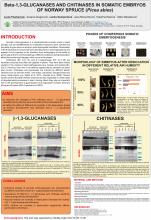Somatic embryogenesis is a developmental process by which a plant somatic cell can dedifferentiate to a totipotent embryonic stem cell that has the ability to give rise to an embryo under appropriate conditions. Desiccation is the final phase of normal embryonic development in most angiosperms and appears to be important in the transition from embryogeny to the ability to germinate and form normal seedlings. Different conditions during desiccation affect the biochemical changes that occur during this phase.
Chitinases (EC 3.2.1.14) and β-1,3-glucanases (EC 3.2.1.39) are hydrolytic enzymes that often act together in plants. They have been widely studied in the context of plant pathogenesis (e.g. Ceasar and Ignacimuthu 2012). However, their role in the defense against abiotic stresses has been also proven. Chitinases and glucanases are induced by different abiotic stresses such as osmotic stress, cold stress, salt stress, drought stress, and heavy metal stress (e.g. Dalen et al. 2015, Fossdal et al. 2009). Recent studies confirm that both of these enzymes are also implicated in a wide range of developmental processes in plants. Among others, they play an important role in the development of gymnosperm and angiosperm somatic embryos (Dong and Dunstan 2000, Dyachok et al. 2002).
Typ publikace
Datum vydání

